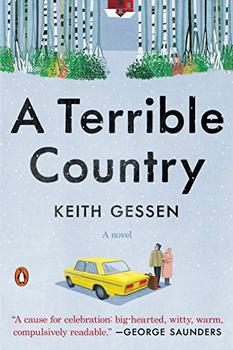Summary | Excerpt | Reviews | Beyond the Book | Readalikes | Genres & Themes | Author Bio

A Novel
by Keith Gessen
Next thing I knew I was standing in the passport control line in the grim basement of Sheremetevo-2 International Airport. It never seemed to change. As long as I'd been flying in here, they made you come down to this basement and wait in line before you got your bags. It was like a purgatory from which you suspected you might be entering someplace other than heaven.
But the Russians looked different than I remembered them. They were well dressed, with good haircuts, and talking on sleek new cell phones. Even the guards in their light-blue short-sleeve uniforms looked cheerful. Though the line was long, several stood off together to the side, laughing. Oil was selling at $114 a barrel, and their army had just won a short little war with Georgia-is that what they were laughing about?
Modernization theory said the following: Wealth and technology are more powerful than culture. Give people nice cars, color televisions, and the ability to travel to Europe, and they'll stop being so aggressive. No two countries with McDonald's franchises will ever go to war with each other. People with cell phones are nicer than people without cell phones.
I wasn't so sure. The Georgians had McDonald's, and the Russians bombed them anyway. As I neared the passport booth, a tall, bespectacled, nicely dressed European, Dutch or German, asked in English if he could cut the line: he had to catch a connecting flight. I nodded yes-we'd have to wait for our luggage anyway-but the man behind me, about the same height as the Dutch guy but much sturdier, in a boxy but not to my eyes inexpensive suit, piped up in Russian-accented English.
"Go back to end of line."
"I'm about to miss my flight," said the Dutchman.
"Go back to end of line."
I said to him in Russian, "What's the difference?"
"There's a big difference," he answered.
"Please?" the Dutchman asked again, in English.
"I said go back. Now." The Russian turned slightly so that he was square with the Dutchman. The latter man kicked his bag in frustration. Then he picked it up and walked to the back of the line.
"He made the correct decision," said the Russian guy to me, in Russian, indicating that as a man of principle he was ready to pummel the Dutch guy for cutting the line.
I didn't answer. A few minutes later, I approached the passport control booth. The young, blond, unsmiling border guard took my battered blue American passport-the passport of a person who lived in a country where you didn't have to carry your passport everywhere you went, where in fact you might not even know where your passport was for months and years at a time-with mild disgust. If he had a passport like mine he'd take better care of it. He checked my name against the terrorist database and buzzed me through the gate to the other side.
[AU/ED: with an American passport, would Andrei be on the same passport line as Russians? In many airports they separate them, yes?]
I was in Russia again.
My grandmother Seva lived in the very center of the city, in an apartment sheÕd been awarded, in the late 1940s, by Joseph Stalin. My brother, Dima, brought this up sometimes, when he was trying to make a point, and so did my grandmother, when she was in a self-deprecating mood. ÒMy Stalin apartment,Ó she called it, as if to remind everyone, and herself, of the moral compromise she had made. Still, in general in our family it was understood that if someone was offering you an apartment, and you lived at the time in a drafty room in a communal apartment with your small daughter, your two brothers, and your mom, then you should take the apartment, no matter who it was from. And itÕs not like Stalin himself was handing her the keys or asking for anything in return. She was at the time a young professor of history at Moscow State University, and had consulted on a film about Ivan the Great, the fifteenth-century Ògatherer of the lands of RusÓ and grandfather to Ivan the Terrible, which Stalin so enjoyed that he declared everyone involved should get an apartment. So in addition to Òmy Stalin apartment,Ó my grandmother also called it Òmy Ivan the Great apartment,Ó and then, if she was speaking honestly, Òmy Yolka apartment,Ó after her daughter, my mother, for whom she had been willing to do anything at all.
Excerpted from A Terrible Country by Keith Gessen. Copyright © 2018 by Keith Gessen. All rights reserved. No part of this excerpt may be reproduced or reprinted without permission in writing from the publisher.
On the whole, human beings want to be good, but not too good and not quite all the time
Click Here to find out who said this, as well as discovering other famous literary quotes!
Your guide toexceptional books
BookBrowse seeks out and recommends the best in contemporary fiction and nonfiction—books that not only engage and entertain but also deepen our understanding of ourselves and the world around us.